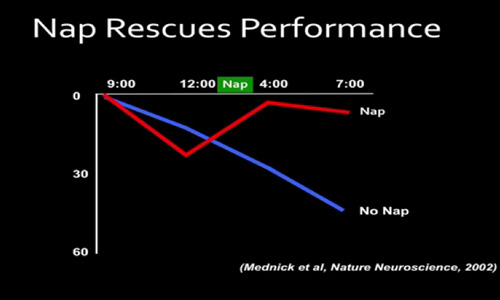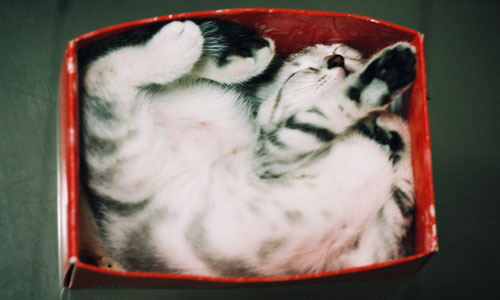Accidentally-Awesome Sleep Research That Will Change Your Life:
So, Dr. Sara Mednick had been struggling for a research topic when she found an interesting opportunity.
Her mentor had only studied what you’d call “normal” sleep that you have at night, but not at other times.
And that’s where she found gold. As she describes in this video, everything on Earth goes through cycles in time, and we’d be smart to remember that.
-Which is where her scientific study comes in, because largely: We Don’t.
And there are real downsides to that. -Especially for quality of life, health, productivity and creativity…
A lot of what she suggests seems foolishly counterintuitive and certainly counter-capitalist.
But wait until she drops the SCIENCE! on you; you’ll see…
We Need To Do More Things Like Taking Breaks:
Her large-scale theme is that we need to take more breaks. And where she got that larger idea is from the simple concept of The Nap.
Everything on Earth operates in the form of a roughly 2/3 Work 1/3 Rest cycle, even plants. [ok fine; Except Cats.]
If nature has done it in every thing, every day, every place on Earth, since the beginning of time, it’s probably a pretty good idea.
And one of the ways you can tell this is by looking at people who don’t get enough sleep.
Sleep Makes You Stronger, Sleep-Debt Really Screws You Up:
Their Metabolisms & Insulin-regulation are all screwed up. And as a result of this imbalance, they crave and eat more high-fat, high-sugar foods.
They also gain weight more quickly, and very-likely have a harder-time losing it, too.
Just ask any Hollywood trainer who’s trying to bulk up someone like John Kracinski or Henry Cavill for a role: Rest & Sleep is a very important part of successful exercise.
This phenomenon is so demonstrably strong, that if you have people getting only 5 hours of sleep for as little as 5 days in a row, their blood-test hormone levels make them look exactly like a Pre-Diabetic.
And on that note, since Obesity & Diabetes are now occuring in epidemic proportions, she suggests maybe if we can fix people’s sleep problems it would be a first step in fixing their overall health.
People who are chronically sleep-deprived also have demonstrably greater risks for all kinds of Cardiovascular disease, Depression-like disorders, and impaired brain-function.
Tony Schwartz agrees.
Testing People’s Ability To Function Over The Course Of A Day:
One of the ways Sara & her team tested this was to run a simple Memory Test at the hours of 9AM, 12PM, 4PM, and 7PM.
They did this for both sleep-deprived and also allegedly “well-rested” people.
And Lo-And-Behold, the average subject’s performance steadily declined over the course of that time.
So to see what we can do to help people with these problems they tried a few experiments to get people back to their 9AM high-score baseline.
Motivation by money didn’t work. People were offered $25 to get back to their original scores, and the researchers never had to pay once.
Next, Rest but not actual Sleep was tried. Even with people sitting in one place with their eyes closed, the test scores were no better.

Only Naps Restored Their Mental Abilities:
And last of all, single 60-Minute Naps were tried, varying between the hours of 12 & 4PM. And that is what turned out to work the best.
The test subject performance went back up to their 9am high-score & stayed there for the next 2 testing sessions at 4PM & 7PM.
In another trial, they wanted to see how far the effects could go, so they only tested people at 9AM & 7PM.
The people who had no naps showed a marked decrease in performance.
The subjects who did get a nap were 2x as good as the non-nappers & did even better than their original 9AM scores.
One 60-Minute Nap Is As Good At Restoring As 1 Whole Night Of Sleep:
So they then tested people who were given a whole, regular 8 hour night of sleep to recover in-between their first and second tests.
On that next day at 9AM, the people given a whole night to get back into mental shape scored exactly the same, and in some cases, slightly less than people who were given that one nap & then tested the same day at 7PM (the worst time for all scores).
And what Sara & her team were able to conclude was that for cognitive performance & Memory, even though it’s only 60-Minutes right in the middle of the day,
1 Nap is just as good as 1 whole Night of sleep!
1 Nap Is As Good As 1 Night Of Sleep, But Even Better For Creativity:
The next thing they decided to test was Creativity.
And their methods were about the same. Test first thing in the morning to establish a baseline, and then test people again in the afternoon after a regular day, or one with the same type of previously-mentioned nap.
The No-Nap had no change in their scores, up or down.
But mystifyingly, the group that did take a Nap had a 40% Increase in their Creativity scores.
And Sara’s next big question to that was, “What is going on in this short-but-amazing bit of sleep. Why is it making such an impact on both Memory & Creativity?”
1)Alertness
2)Creativity
3)Stress
4)Productivity
5)Job Satisfaction & Performance
6)Stamina
7)Decisionmaking
8)Aging
9)Weight loss
10)Cardio Health
11)Mental Health
12)Memory
Why Does A Nap Make You Better?:
The simple answer she got to is that the brain must be able to do things during sleep that it just can’t while you’re awake.
When you’re awake, you are bombarded with all kinds of new info & data, and it’s almost compulsory that you interact with your world in some way.
But during sleep, your body can repair its structure, and also improve your brain.
The most-recent set of info you’ve gotten can be consolidated into Long-Term-Memory.
And the state it puts your mind into lets you associate that new data with your existing knowledgebase.
Free Your Mind Neo, Take A Nap:
Sleep lets you free-associate, hypothesis-test, infer & discover patterns in the new stuff based on the structures you already understand.
All of the processes that were low-volume & subconscious when you were awake take over your whole brain when you’re asleep.
There’s also a good chance that some of the “Logical Sense-Making Traffic-Cop” gets turned down or off to do this, as previous experiments have shown people who’ve just had a few drinks are more creative.
And somehow, if it’s done right, you wake up with a mind that’s almost been “Rebooted”, in just 60-90 minutes.
I guess Sara’s thesis-advisor really was studying the less-intersting type of sleep after-all.

If Your Workday Could Use A Tune-Up, So Could Your Week:
Now here’s where she takes that idea and generalizes it up a few levels of altitude to talk about a bigger timeframe.
Well if Nature has everything running on a 2/3 Work, 1/3 Rest clock, what if we look at a bigger timeframe like A Week?
Westernized countries and most 1st-World countries all basically have 5 days of Work to 2 days of Rest. It’s a little similar the ratio of day to night, but not quite.
Now as she’s shown before based on the non-nap memory-tests, average work performance across a token 8-Hour-Day is normally pretty terrible.
-So then for a bigger timeframe 1 level up than just a Day, Why do we think a Week is going to be any different?
Well, SPOLIER ALERT, BUTCHES! It’s not. “Hump Day” & “TGIF” aren’t just clichéd aphorisms, they’re really pretty accurate.
TGIF Is Not A Myth, Productivity Does Go Down After Monday:
Because Sara’s team did the tests & Productivity ABSOLUTELY DOES Go Down from Mon through Fri. -As much as we hate Mondays, they’re our most productive day of the week according to Team Sara.
So what do we do?
We Self-Medicate the hell out of ourselves. Ahem!.
We use Caffeine like 90% of all North-Americans (who don’t even drink as much as Scandinavians!), or even things Adderal or Ritalin which are used by 75% of all college-kids and whose use has tripled in the last 10 years.
So if Naps are so great and almost nobody uses them, why not compare them to the things that people do use, like Coffee?
But Wait, Doesn’t Coffee Make Us Work Better? Erm,…:
So that’s what Sara did. She gave people a Verbal Memory Test & a Motor-Skill Typing Test.
The tests were done the same way as before on 3 groups of people; subjects who had either a Nap, ~50mg of Caffeine, or a Caffeine-Placebo. None were done for the previous drugs.
The Verbal Test Results: Nappers performed Great, Placebo subjects were surprisingly good at 75% of the Nappers, and Caffeinated-subjects were not that great at 50% or less.
And then The Motor Test Results for off-handed typing: The Nappers again did Great, Placebo subjects did about 20% better, and Caffeine-recipients did about 85% Worse than the Nappers.
Nope, Coffee Only Makes You -Feel- More Alert:
So Caffeine isn’t actually helping you with anything other than a feeling of alertness.
And then what makes it worse is that Caffeine can stay in your system for quite awhile and actually ruin the sleep you were supposed to be getting in the first place!
So then people end-up taxing their systems even more by Taking More Drugs, like Ambien, etc. and end up sleep-eating an entire wheel of Brie with no recollection, or freaking out all of First-Class on a flight to Los Angeles.

Best Idea In A Long Time: Goodbye Hump-Day!:
-But what if we could be better, more creative & productive throughout the Week without the use of drugs, just the way a Nap fixes us up during the Day?
What if the ratio of Time Working/Time Resting can also be looked at over the course of a week?
Well then we’re already working too much without enough rest, because 5 days on is less than 2/3.
So, her idea is if you could look at the Weekend as you do the sleeping hours of the night,.
Then if we could all get Wednesday afternoon off, it could be viewed as a “Nap”.
Freakonomics, ACTIVATE! Shorter Work-Weeks Could RAISE Productivity:
What if that could it make us all better at what we do?
Well experiments like this are already happening all over the world. The work-week France is already down (for a variety of reasons) to 30 Hours, and in The Netherlands, it’s down to 25 Hours.
And economists predict this decrease actually improves and grows the overall national-product, because it can bring a higher total number of people in to jobs and lower total unemployment.
One example: it makes having a job much more doable for new moms.
And just like sleep, there are also benefits to getting certain tasks out of your head and letting your subconcscious work on them.
This “Background Processing” that Zen Buddhists are so good at with their Mantras may actually have a counterpart.
In giving people a mid-week break from the problems they continually work on, people’s Thursday Morning ideas might just end up being a Lot better.
What About The Work YEAR? -Well, “Unlimited Vacation” Actually Does Equal Greater Productivity:
Well what if you thought about this in terms of The Year inst. of just the Work-Week?
Americans get some of the shortest paid Vacations in the developed world, at just under 2 weeks on average; -and decreasing.
Europeans get an average of between 5 and 6 weeks of vacation.
More Vacation Actually Makes You Work Better:
The funny part of this for us is that many studies have shown the more vacation you take, the more Productive and Happy you are, the longer you stay at a given job & the higher your Performance is as rated by your supervisor.
And similar to our continental friends, newer companies are starting to do their own riff on this.
A handful of these companies have implemented something called “Unlimited Vacation”, (with hopefully not Too Much bait & switch, btw).
-And on average, they have reported about 200 Per-Cent Increases in productivity since starting the plans.
So, at least in those fields, probably high-tech like Google, giving people that freedom & trusting them to still get their work done, real actual numbers are backing up the idea of another kind of Break or Work-Downtime actually being a very healthy thing.
-Just like a Nap is for your Brain, Metabolism, and Health!
Check out the details at the Links:
Photo/Video Credits:
“Give it Up for the Down State – Sleep: Sara Mednick at TEDxUCRSalon” video by TEDx and Dr. Sara Mednick
“funny sleeping cat (not animal abuse!)”, entry image by SW Yang
Nap Rescues Performance, Weekday Deterioration, and Caffeine vs. Napping charts, by Dr. Sara Mednick
Links
• Source: TEDx-Give it Up for the Down State – Sleep: Sara Mednick at TEDxUCRSalon
• via: Neatorama
• More Coverage: Amazon-Sara Mednick’s Book: Take A Nap, Change Your Life
• Source Studies:
• N.Neurosci-Sleep-dependent learning: a nap is as good as a night
• Full[er] Text-Sleep-dependent learning: a nap is as good as a night[PDF]
• BehBrnRes-Comparing the benefits of Caffeine, Naps and Placebo on Verbal, Motor and Perceptual Memory















